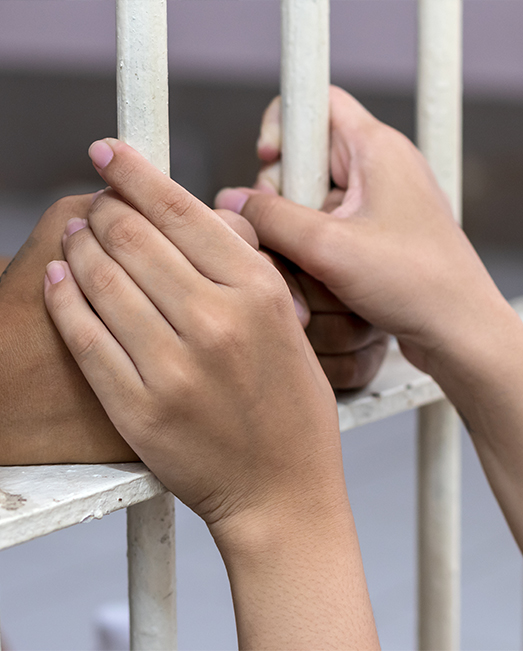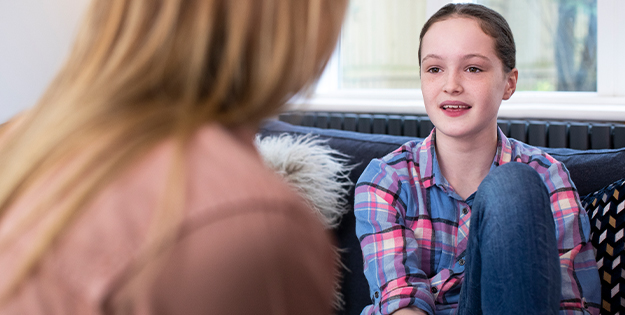Career
Copyright@ Australian Catholic University 1998-2026 | ABN 15 050 192 660 CRICOS registered provider: 00004G | PRV12008
Copyright@ Australian Catholic University 1998-2026 | ABN 15 050 192 660 CRICOS registered provider: 00004G | PRV12008

Narelle Patterson used her Master of Social Work at ACU to dedicate her career to working with kids whose parents are in jail. Narelle says the work can be heart wrenching, but she knows her support can make all the difference.
Narelle first came to ACU after being made redundant during the global financial crisis in 2009.
“It was really hard to find something else. Until then I’d been getting by with my undergraduate degree, but I thought a postgraduate qualification would help improve my career prospects,” she said. “I’ve since been proven right, and my Master of Social Work was just what I needed.”
Narelle said she was always drawn to social work.
“I did a Bachelor of Arts a number of years ago and I studied anthropology and sociology.
"I’ve always been fascinated with people, communities and relationships, and how these impact people's lives. Together, this all led me to social work.
"I’ve been working in the field for a while now and it still feels like the right fit for me.”
Narelle completed her Master of Social Work at the Strathfield Campus.
“I liked learning about ethics and practice standards and the theories behind it all. My master’s studies reminded me why I wanted to work in community services and with disadvantaged people. It also really helped that I’m now a member of the Australian Association of Social Workers (AASW), which made me feel more secure as they offer a lot of support.”

However, Narelle didn’t have the easiest time as a student and needed extra help to make it through the course.
“In 2003 I had a brain tumour removed, which was very difficult,” Narelle explained. “I really struggled with completing tasks on time as the tumour had done all kinds of things to my planning, organisational and other cognitive skills, so I was a lot slower.
"But I got so much support from the teaching staff and the disability support service to get my studies done and I wasn’t penalised. I couldn’t have got through without their help and I’m so glad I persevered with it all. The tumour still impacts me today though – when somebody digs around inside your head that has a fairly lasting impact! But mostly I’m pretty good.
During her master’s Narelle switched to part-time study to fit in a role working as a community development officer with a local council. She then went to work for Wesley Mission in out-of-home care.
“Like most jobs in this sector it was quite demanding. But I think you learn that pretty quickly and you just roll with it,” said Narelle.
“It helped that it was an area I was so passionate about – I’ve always felt that kids in out-of-home care don’t get a good deal.
“I now work at Shine for Kids as the coordinator for the Rise education program, which provides educational support to children who have a parent or guardian in jail.
“Families and children tend to be forgotten in that whole area of imprisonment. We work with both the families and the inmates, running parenting programs and assisting with visits.

“So, we support the children one-on-one either in or outside of the classroom. Really, we’re just trying to provide a stable person who is there, just for them, which means a lot to the kids. Often, but not always, their lives can be fairly chaotic, and things can change for them so quickly.
"But through Rise, they’ve still got one person who's there, who turns up to school every week to spend time with them. It’s a real support for the kids and it helps them navigate the world and the tough things in life.
“The kids are often struggling with the fact that either one, or in some cases both parents, have been removed from their lives. And then suddenly they don't have that contact, and that person is not there for them to turn to.
“Another problem they face is their parent could be in a jail that is far away from their home. This can really impact their learning at school. They might become known as difficult for teachers to manage or become withdrawn and stop getting involved in the classroom. There are so many different ways a child could react to a parent going to jail. It’s so difficult as they miss their parent deeply and they want to see them.
“I remember working with one girl in our program who was so down about not being able to see her father. She used to talk to me about it, asking all the time, ‘Why can't I see him? I don't understand why I can't see him.’ And, truthfully, nobody seemed to be able to give her a good explanation.
“We also work with their families to offer extra help, telling them, ‘You’re okay, we’re here. We’ll support you with whatever you need.’ Of course, this type of work can be quite heart wrenching, but that’s what we do.”

In spite of the demanding roles Narelle as worked in over the years, she’s still happy with her calling in spite of the misconceptions people might have.
“Sometimes people think social workers are a bunch of do-gooders and bleeding hearts. That’s not all true – people do social work for many different reasons. Mostly it’s for those who like being with people and seeing them through hard times.
“It takes commitment to be a good social worker and you have to be honest with people and honest about yourself. You need to be able to say, ‘I can't do this’. It’s about
getting out there and sometimes getting your hands dirty, but also working in areas where you can affect change. Just think hard about what you really want to do with your life and what really spins your wheels.”
But Narelle’s best advice for pursuing a social work career is to listen to the experts advice first.
“I went along to the Open Day at the Strathfield Campus to see if it would be a good fit for me – I didn’t want to waste my time. I spoke to a lecturer from the course and she was very honest and forthright with me, which was fantastic. It really helps to hear about social work from someone directly who knows what it’s like.”
If you’re interested in a career like Narelle’s, explore where a degree in social work can take you.
Copyright@ Australian Catholic University 1998-2026 | ABN 15 050 192 660 CRICOS registered provider: 00004G | PRV12008